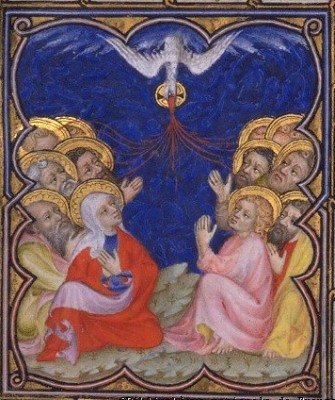 |
European icon of Pentecost -
When the Holy Spirit descended
upon the disciples (incl. St. Mary)
and the Church was born. |
On the Feast of Pentecost, the 19th of May, 2013, we celebrated four four new births into the Household of God; two adults and two infants. You can see pictures
here. The newly Baptized included Yoko Kobori who was introduced to us by a friend and new member at St. Peter's, Tsuneko Nakatani. Greg Musick was introduced to us through Kathy Cox and our annual Multicultural Holiday Craft Fair. And the toddlers (unnamed for child web policy reasons) were introduced to us through their parents, Tony and Stacey (Asato) Edin and Annaka and Fr. James Thibodeaux.
An outdoor Baptism at Pentecost?!
 |
| Baptism at St. Peter's Episcopal, Seattle |
The Church is changing. And here I mean the capital 'C' Church, not just St. Peter's. You may notice that many parishes have become more open and inviting at the Communion Table, having discovered that it is God who invites us to Communion. As this has evolved so have new practices about Baptism.
Baptism has gone from a private event with very little preparation and using very little water to a very public event using LOTS of water and requiring much more formation and learning for the candidates. Baptismal Fonts have taken a prevalent place at the entrances to the worship space, indicating it is through Baptism we enter into God's Household and Covenant of Salvation. And the Book of Common Prayer now indicates that Baptisms should occur on Easter or any of the other 7 Principle Feasts (Can you name them? Hint: Pentecost is one!), emphasizing the importance and meanings of the Sacrament of Baptism. All these changes are a recovery of the Early Church's practice of Baptism.
 |
Medieval style of Baptism -
private and infant focused |
Beginning in the Medieval period and continuing till just recently, the Church assumed that most Baptisms were going to be infants and that the children would pick up the essentials of the Christian Faith as they grew up. (See the headings of the
Catechism in your Book of Common Prayer for a list of faith essentials) We were mistaken. Decades later many of those children had left the Church and many of those who remained were confused or had little understanding of the faith beyond ethics (i.e. being good and doing the right thing). Spirituality, theology, liturgy, polity (structure and culture of a denomination), and major history have often been neglected. To counter that experience, the Church has been moving towards showing how Baptism is and always has been a major commitment (i.e. eternal covenant) requiring a deep shift (i.e. conversion) in one's thinking, being, and acting.
 |
Ancient Baptismal Font in Rome -
public, large, adult and infant focused.
The Early Church practice emphasized
that Baptism marked public conversion to
a Christ-like life. |
In very simple terms, it has been getting easier to come to the Altar for Communion, but becoming more challenging to enter into Baptism. And this reflects our belief that God always accepts us as we are, but is never content to let us remain as we are. God is a perfectionist. And because God loves us, God will settle for nothing less than perfection for us (Heaven) and in us (Divinity). Baptism is where God's promise begins.
For more about Witsunday, Pentecost, traditions, and meanings, see
this article from "Full Homely Divinity"











